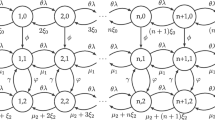Abstract
In this paper priority is assigned to the handover calls over new call attempts and blocked handover calls are placed in a finite storage queue. Total handover forced termination probability is evaluated and a suitable function for the mean service time at each position in the queue is theoretically estimated. Quality of service is obtained by introducing a threshold in the maximum waiting time of a handover call in the queue. In case the handover call mean service time at each queue position is found to be greater than this threshold, this call will be blocked. Simulation results show that this scheme provides satisfactory results for both types of calls.
Similar content being viewed by others
References
D. Hong and S.S. Rappaport, “Traffic Model and Performance Analysis for Cellular Mobile Radio Telephone Systems with Prioritized and Non Prioritized Handoff Procedures”, IEEE Transactions on Vehicular Technology, Vol. VT-35, pp. 77–91, 1985.
I. Panoutsopoulos, S. Kotsopoulos, C. Ioannou, and S. Louvros, “A New Proposed Priority Technique to Optimize the Handover Procedure in Personal Communication Systems”, IEE Electronics Letters, Vol. 36, No 7, pp. 669–670, March 2000.
R. Ramjee, R. Nagarajan, and D. Towsley, “On Optimal Call Admission Control in Cellular Networks”, University of Massachusetts Technical Report UM-CS-1995-064, 1995.
R. Guerin, “Queuing-Blocking System with Two Arrival Stream and Guard Channels”, IEEE Transactions on Communications, Vol. 36, No 2, February 1988.
C.-J. Chang, T.-T. Su, and Y.-Y. Chiang, “Analysis of a Cutoff Priority Cellular Radio System with Finite Queuing and Reneging/Dropping”, IEEE/ACM Transactions on Networking, Vol. 2, No 2, April 1994.
Author information
Authors and Affiliations
Additional information
Spiros Louvros was born in Corfu Island, Hellas in 1971. He received his Bachelor in Physics from the University of Crete, Hellas and his Master of Science in telecommunications from the University of Cranfield, U.K. with a graduate scholarship from the Alexandros Onassis Institution. In 2004 he received his PhD from the University of Patras, Hellas, in mobile communications. He has worked for Siemens as a microwave engineer, for Vodafon-Hellas as a switching engineer and for Cosmote S.A. as section manager in the Operations, Maintenance & Optimization Department. His current occupation is in the Telecommunication Systems & Networks Department, Technical University of Messologi, Hellas, as an Assistant Professor. He holds several papers in international journals and conferences and he has participated in several research projects regarding mobile communications. His area of interest is in mobile networks, telecommunication traffic engineering, wireless ATM and optical communications and is documented by over 30 papers in international literature and conference proceedings. He is member of FITCE and Hellenic Physics Union.
Gerasimos Pylarinos – Stamatelatos was born in Kefalonia, Greece in 1966. He receieved the B.E. in Electrical and Computer Systems Engineering from Monash University, Melbourne, Australia in 1992 and the B.E. in Electrical and Computer Systems Engineering from the University of Patras, Greece in 1994. He received the M.Sc. in Data Communications Systems from Brunel University, United Kingdom. He is currently pursuing the PhD degree at the University of Patras Greece. He has worked at Philips Radio Communication Systems, Melbourne, Australia developing hardware for mobile radio communication systems for 2 years. He subsequently worked as project manager in the Research and Development department at Intracom Radio Communication Systems, Greece for 7 years. He is now manager of the Biomedical Engineering department of Kefalonia Hospital, Greece. His research interests lie in the areas of 3G and 4G wireless communications.
S. Kotsopoulos was born in Argos-Argolidos (Greece) in the year 1952. He received his B.Sc. in Physics in the year 1975 from the University of Thessaloniki, and in the year 1984 got his Diploma in Electrical and Computer Engineering from the University of Patras. He did his postgraduate studies in the University of Bradford in United Kingdom. And he is an M.Phil and Ph.D. holder since 1978 and 1985 correspondingly. Currently he is member of the academic staff of the Department of Electrical and Computer Engineering of the University of Patras and holds the position of Associate Professor. Since 2004, is the Director of the Wireless Telecommunications Laboratory and develops his professional life teaching and doing research in the scientific area of Telecommunications, with interest in mobile communications, interference, satellite communications, telematics applications, communication services and antennae design. Moreover he is the (co)author of the book titled “mobile telephony”. The research activity is documented by more than 160 publications in scientific journals and proceedings of International Conferences. Associate Professor Kotsopoulos has been the leader of several international and many national research projects. Finally, he is member of the Greek Physicists Society and member of the Technical Chamber of Greece.
Rights and permissions
About this article
Cite this article
Louvros, S., Pylarinos, J. & Kotsopoulos, S. Mean Waiting Time Analysis in Finite Storage Queues for Wireless Cellular Networks. Wireless Pers Commun 40, 145–155 (2007). https://doi.org/10.1007/s11277-006-9093-y
Published:
Issue Date:
DOI: https://doi.org/10.1007/s11277-006-9093-y




